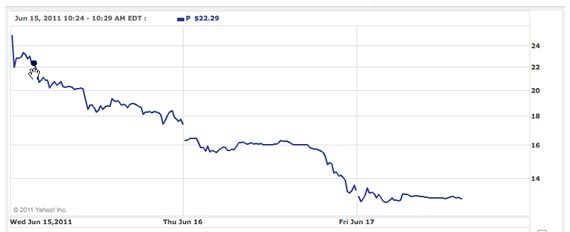
 Pandora Media went public this week on June 15, with an offering priced at $16 per share. The stock opened at $20 a share, hitting a high of $26 and closing at $17.42. On Tuesday, before shares went onto the open market the company was valued at $2.6 billion. At one point on Wednesday the value had climbed to $4 billion. But by the end of the day on Thursday, the stock had dropped 24% and once again was worth about $2.1 billion. As of this writing mid-day June 17, the stock is down about 3% at $12.85 per share for a market cap of about $1.96 billion. So what happened to the wings on which Pandora was soaring?
Pandora Media went public this week on June 15, with an offering priced at $16 per share. The stock opened at $20 a share, hitting a high of $26 and closing at $17.42. On Tuesday, before shares went onto the open market the company was valued at $2.6 billion. At one point on Wednesday the value had climbed to $4 billion. But by the end of the day on Thursday, the stock had dropped 24% and once again was worth about $2.1 billion. As of this writing mid-day June 17, the stock is down about 3% at $12.85 per share for a market cap of about $1.96 billion. So what happened to the wings on which Pandora was soaring?
 A large part of the problem can be traced to BTIG Research analyst Richard Greenfield who came out shortly after the IPO with a sell rating and a price target of $5.50. [ouch]
A large part of the problem can be traced to BTIG Research analyst Richard Greenfield who came out shortly after the IPO with a sell rating and a price target of $5.50. [ouch]
Greenfield pointed to a new scenario with more competition for the web radio service from companies such as Spotify and Turntable.fm.
“While Pandora is creating a large active user base, its reach/frequency continues to pale in comparison to terrestrial radio, as does its profitability,” says Greenfiled. “Pandora’s fundamental problem is that active users and listening hours are growing rapidly, but those listener hours have fixed (and annually escalating) royalty costs per streaming hour (fees to music labels).”
Another way to explain the above comment is to say that the business doesn’t scale.
In an interview posted on AllThingsD, writer Peter Kafka asks Pandora CEO Joe Kennedy about the effect of Internet and Pandora coming to auto dashboards. Kennedy says, “We’ve had announcements from six of the world’s major automakers — Ford, Toyota, GM, Mercedes, BMW and Hyundai — and they’ve all said, ‘we’re going to integrate Pandora into our vehicles going forward.’ Now, the nature of automotive is, it isn’t a flip-the-switch phenomena. It rolls out over several models, over time. And then you have a replacement cycle that’s about 7 years per car. So I think of automotive as a snowball, that starts out relatively small, but builds and builds and builds and builds. You get out to years five to ten, and it’s tremendously big.”

About the Author
David M. Ross has been covering Nashville's music industry for over 25 years. dross@musicrow.comView Author Profile


